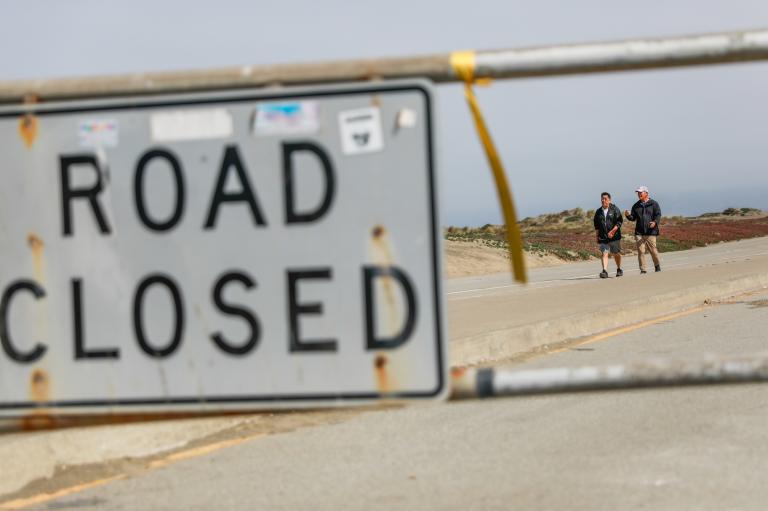 Matthew KenneyPhoto: AP/Courtesy of Joanne KenneyWoke up this morning to a truly depressing story in my Twitter feed. It’s about a man serving a 10-year sentence for killing a 14-year-old boy with his car in Prospect, Conn. The boy, Matthew Kenney, was riding his bike in the road when, according to prosecutors, David Weaving tried to overtake another vehicle at 83 miles per hour in a 45-hour zone. He was convicted of manslaughter in the case.
Matthew KenneyPhoto: AP/Courtesy of Joanne KenneyWoke up this morning to a truly depressing story in my Twitter feed. It’s about a man serving a 10-year sentence for killing a 14-year-old boy with his car in Prospect, Conn. The boy, Matthew Kenney, was riding his bike in the road when, according to prosecutors, David Weaving tried to overtake another vehicle at 83 miles per hour in a 45-hour zone. He was convicted of manslaughter in the case.
Now Weaving is suing the boy’s family for not making their son wear a helmet (bike helmets are mandatory for kids under the age of 15 in Connecticut, but not wearing one does not constitute a violation under state law).
That’s right. The man is suing the parents of the boy he was convicted of killing for “contributory negligence.”
Before killing Kenney with his car, Weaving was convicted four times for driving drunk. He got his license back every time. The Kenney family is preparing to sue the state’s Department of Motor Vehicles for that. They are also suing Weaving for $15,000 in damages.
Weaving’s countersuit against the family claims
he’s endured “great mental and emotional pain and suffering,” wrongful conviction and imprisonment, and the loss of his “capacity to carry on in life’s activities.”
One of Weaving’s lawyers thinks the lawsuit makes perfect sense:
Attorney Andrew Cates calls Weaving’s countersuit a part of the legal process. Cates is representing Weaving in appeals aimed at overturning his convictions — which were recently upheld by the state Appellate Court — but is not involved with the lawsuit involving the Kenneys.
“I can see their side of it. I’m a parent,” Cates said. “But I can also see the other side of it. If you’re driving down the street and your car makes contact with a pedestrian and you think it’s the pedestrian’s fault, you have to raise the issue.”
This comes just days after a story out of Colorado landed in my inbox numerous times. That one, which was written up in multiple venues, involves a high-end financial manager named Martin Joel Erzinger, who allegedly hit a man on a bicycle with his car and then fled the scene. Erzinger was allowed by the Eagle County District Attorney to avoid a felony charge in the case:
“Felony convictions have some pretty serious job implications for someone in Mr. Erzinger’s profession, and that entered into it,” Hurlbert said. “When you’re talking about restitution, you don’t want to take away his ability to pay.”
This despite the fact that the man allegedly hit by Erzinger, Dr. Steven Milo, had let the DA know that money wasn’t an issue as far as he was concerned:
Milo wrote in a letter to District Attorney Mark Hurlbert that the case “has always been about responsibility, not money.”
“Mr. Erzinger struck me, fled and left me for dead on the highway,” Milo wrote. “Neither his financial prominence nor my financial situation should be factors in your prosecution of this case.”
Milo was left with spinal cord injuries, bleeding on the brain, and damage to his knee. Erzinger was left facing misdemeanor charges.
Our roads are filled with reckless, irresponsible drivers who rarely have to reckon with the consequences of their actions. Because car dependence is so fundamentally built into our culture, we have a legal system that allows drunk drivers to get back behind the wheel time after time, and prosecutors who are all too willing to go easy on people who kill and maim other road users with their vehicles.
No wonder so many people feel unsafe on our nation’s roads and streets unless they, too, are protected by the carapace of a car.
It doesn’t have to be like this. In the Netherlands, the law is very different. From the BicycleLaw.com blog:
In the Netherlands, the law imposes a rebuttable presumption of liability on drivers — if a motorist is involved in a crash with a cyclist, the law presumes that the motorist is liable for the crash, unless the motorist can rebut that presumption with evidence to the contrary. The reason for this shift is that the Dutch recognized that the cyclist will virtually always be the injured party in a collision with an automobile, and by putting the onus of fault on the driver, have provided motorists with a powerful legal incentive to pay more attention to the presence of cyclists.
Imagine that.
Hat tip to @amsterdamized and Cyclelicious.



